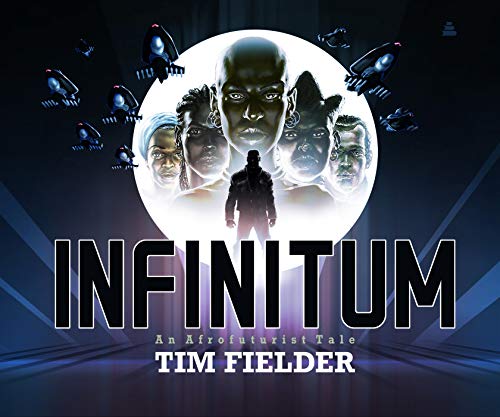Afrofuturism, a movement that began in the Black community during the early 20th Century as an escape from racial hostility, economic turmoil, and aggressive policing, is enjoying a renaissance witnessed by the record-breaking success of creative projects, including the Oscar-winning Marvel Studios film, Black Panther; Regina King’s Emmy-winning HBO superhero tale, Watchmen; Janelle Monae’s hit album, Dirty Computer; Jordan Peele’s provocative feature Get Out; Octavia Butler’s famed science fiction novel, Kindred; and Beyonce’s visual album Black Is King. Now comes Afrofuturist Tim Fielder’s beautifully written and rendered INFINITUM.
In INFINITUM, King Aja Ọba and Queen Lewa are revered across the African continent for their impressive political and military skills. Yet the future of their kingdom is in jeopardy, for the royal couple do not have an heir of their own. When the King kidnaps his son born to a concubine, Obinrin, she curses Ọba with the “gift” of immortality. After enjoying long, wonderful lives both, Queen Lewa and the crown prince die naturally, leaving the ageless bereaved King Ọba heartbroken and alone. Taking advantage of Ọba’s vulnerability, enemy nations rise to power and kill the king – or so they think. King Aja Ọba survives the fatal attack, finally realizing the bitter fruit of Obinrin’s curse.
For millennia, the immortal Ọba wanders the earth, mourning his lost subjects and searching for a new kingdom. His journey leads him across time, allowing him to witness the trans-Atlantic slave trade, the New World, and the American Civil Rights Movement. The expansion of global technology brings about intergalactic travel, first contact with an alien species, and conflicts within and ultimately outside the known universe. Thrust into these seminal events, Ọba, now known by many as “John,” faces harrowing decisions that will determine mankind’s physical and spiritual trajectory.
In 280 plus stunningly emotional and evocative full-color images, INFINITUM presents a unique cosmic experience, addressing issues of racism, classism, gender inequity, the encroachment of technology and the spiritual cost of war, while exposing the history behind ancient mysteries.











Reviews
There are no reviews yet.